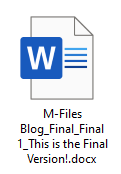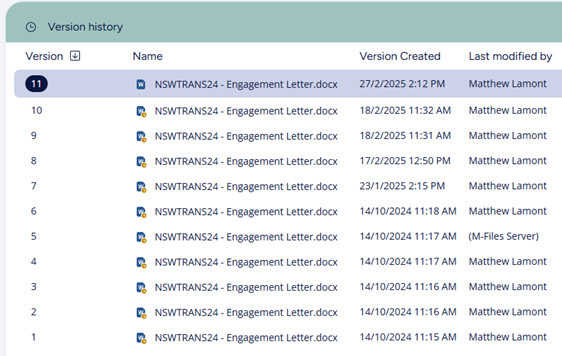“Is this the latest version?”: Bid Farewell to Version Control Problems with M-Files
Introduction
Effectively managing document versioning presents a significant challenge for organisations. Poor version control can lead to confusion, errors, and inconsistencies that increase costs and risks. Implementing robust version control practices is, therefore, essential for maintaining organisation, accuracy, and consistency across teams. Without it, organisations risk confusion, wasted time, and potential compliance issues.
The good news is that knowledge workers and their organisations can avoid version control problems by implementing a robust information management system. These platforms centralise document storage, automate version tracking, and control access, ensuring that everyone works with the most up-to-date and accurate information.
In this post we’ll delve more into the consequences of poor version control and how market-leading information platform M-Files can help eliminate these problems.
The costs and consequences of poor version control
Poor document version control can have wide-reaching consequences:
- Wasted time: Searching through multiple versions of the same file and comparing changes wastes time and holds back productivity. IT industry analysts, IDC, estimate that knowledge workers spend an average of 18 minutes to locate a document, costing nearly $20,000 per information worker annually.
- Inconsistency and errors: Without proper controls, team members may inadvertently use outdated information, leading to errors and inconsistencies. How many times have you worked on a report with a colleague, only to find the file you’re working on is not the latest version? We understand, it’s frustrating.
- Compliance issues: In regulated industries, maintaining accurate version histories is crucial for compliance. Failure to do so can result in crippling fines and liability issues. Further, not maintaining robust document version history can jeopardise hard-earned certifications, such as ISO 9001 for quality management systems.
What’s worse is that traditional folder-based systems exacerbate version control problems. They rely on team members to correctly label and file documents, which is prone to error. Folder-based systems often lead to:
- Duplicate documents: The same document may exist in multiple folders, creating confusion about which version is the most current.
- Poor naming conventions: Inconsistent or unclear naming schemes make it difficult to locate the right version. This can lead to wasted effort recreating documents that already exist.

M-Files: A smarter approach to version control
M-Files offers a revolutionary approach to document management by doing away with traditional folders. Instead, M-Files uses metadata to organise documents based on what they are, not where they are stored. Metadata consists of tags or attributes attached to a document, such as vendor name, PO number or date. This allows users to quickly and dynamically retrieve all relevant information.
With M-Files, each time a document is altered, a new object version is automatically created. BUT, the new version is not an additional copy of the document, virtually guaranteeing that when a user opens a document in M-Files, it is the latest version.
Better still, M-Files comprehensively tracks the history of that object with timestamps of when changes were made, by who, and what the changes were. This ensures that all previous versions are stored and easily accessible without creating multiple copies of the same file.
In short, M-Files maintains one authoritative copy of a document, eliminating version control issues.

Key features and benefits of M-Files version control
M-Files offers a range of features that streamline document version control and enhance productivity:
1.
Document comparison:
M-Files allows users to compare different versions of a document to quickly identify changes. The system will even highlight the differences.
2.
Version rollback:
Users can easily revert to an earlier version of a document if necessary. M-Files preserves older versions of a document, making it easy to revert to a previous version when necessary.
3. Full audit trail:
M-Files automatically tracks who has accessed a document and what actions they took with it. A comprehensive change log tracks usernames, timestamps, and comments. This provides a seamless audit trail for the lifecycle of the document.
4.
Check-in/Check-out:
M-Files uses a process where an object is checked out, altered, then checked in. This functionality helps users keep track of when and by whom a document is edited.
5.
Dynamic permissions:
M-Files
automatically applies permissions to govern who has access to any document. Access permissions can be controlled by user, group, role, and any metadata property.
6.
Co-authoring:
Multiple users can co-author documents in real time, editing, annotating, or commenting simultaneously.
Wrapping up: Not having M-Files is costing your organisation money
Without a robust information management solution like M-Files, your organisation risks incurring significant costs associated with version control inefficiencies. The lack of version control systems and processes leads to wasted time searching for the correct document version, rework due to using outdated information, increased risk of errors, and compliance violations.
M-Files centralises document storage, automates version tracking, and controls access, ensuring that everyone works with the most up-to-date and accurate information. Investing in M-Files is, therefore, not just about improving document management. It is about mitigating financial risks and enhancing overall operational efficiency.
Talk to the team at Innovative Content Management today about how we can help make version control problems a thing of the past for you and your team.
More Articles

Share



